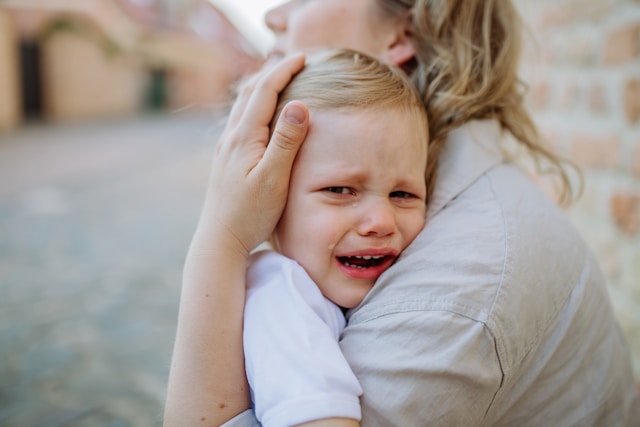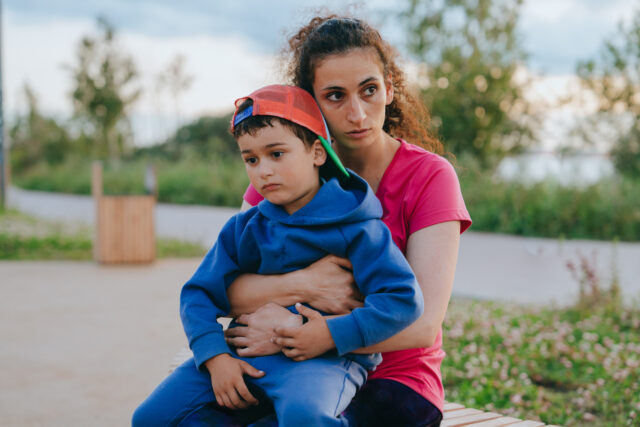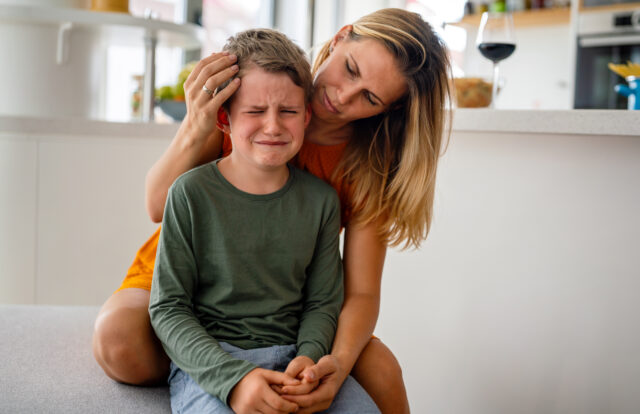When a child experiences loss, finding the right words can feel impossible.

It’s hard enough knowing what to say to adults when someone they care about passes away; with kids, it’s even more of a sensitive subject, and the right words are even harder to come by (if they exist at all). The most important thing here is that they need honesty, comfort, and reassurance, but in a way they can understand. Here are a few things you can say that feel natural, human, and supportive. They’ll hopefully offer a bit of comfort and tenderness to their broken hearts.
1. “I know this doesn’t make sense right now, and that’s okay.”

Grief is confusing, especially for a child who may not fully understand what’s happened. Acknowledging their confusion instead of trying to fix it lets them know it’s okay to feel lost. They may ask big questions or struggle to grasp the finality of loss. Instead of forcing explanations, giving them permission to sit with their feelings reassures them that their emotions are valid, even if they don’t have all the answers.
2. “You don’t have to be strong. You can cry, talk, or just sit quietly.”

Children often feel pressure to be brave or hold in their emotions, especially if they see adults around them struggling. Letting them know they don’t have to perform strength gives them space to grieve in their own way. Some kids might cry immediately, others may seem unaffected at first. Giving them the choice to express themselves however they need to removes any pressure to grieve in a certain way.
3. “I miss them too, and it’s okay to talk about them.”

Kids often take cues from adults — if no one mentions the person who passed, they may feel like they shouldn’t either. Telling them directly that it’s okay to remember and talk about them keeps that connection open. They might worry about making you sad by bringing them up, so hearing that it’s safe to share memories can be a relief. It also shows that sadness and love can exist together, which helps them process grief.
4. “They loved you so much, and that love doesn’t go away.”

For children, the idea of someone being “gone” can feel too big to understand. Reassuring them that love isn’t something that disappears can be comforting when everything else feels uncertain. Even if they don’t fully grasp the idea of love continuing beyond loss, hearing that their bond with that person still matters can bring them a sense of security.
5. “It’s okay if you don’t feel sad all the time.”

Grief isn’t constant, and kids might feel guilty for laughing or playing when they’re supposed to be sad. Letting them know that feeling happy doesn’t mean they’ve forgotten helps them understand that grief comes in waves. They need to know they’re not doing something wrong by having fun. Reassuring them that it’s normal to feel all kinds of emotions, even at unexpected times, takes away any guilt they might be carrying.
6. “I don’t have all the answers, but I’m here.”

Kids will often ask big questions like, “Where did they go?” or “Why did this happen?” and sometimes, there aren’t easy answers. It’s okay to admit that you don’t know. What they really need isn’t a perfect explanation, but reassurance that they’re not alone. Letting them know that you’re there, even when answers aren’t, gives them a safe place to process their emotions.
7. “Some days will feel harder than others, and that’s normal.”

Grief isn’t linear, but kids don’t always understand why they suddenly feel sad on a random day. Helping them see that this is just part of the process can prevent them from feeling like something is “wrong” with them. They may not understand that grief changes over time, so preparing them for the ups and downs can help them adjust without fear or frustration.
8. “You can ask me anything, even if you think it’s a weird question.”

Children’s minds work differently from adults’, and they may have thoughts or questions that seem unexpected. They might ask if their loved one can still see them, or if they’ll ever come back. Letting them know it’s okay to ask anything means they won’t have to bottle up their curiosity or confusion. It also helps them process their loss in a way that makes sense to them.
9. “You don’t have to remember everything about them — just what matters to you.”

Kids can sometimes panic if they start forgetting little details, like a voice or a favourite phrase. Reassuring them that they don’t need to remember everything helps take that pressure off. Encouraging them to focus on the moments that made them happy helps keep their loved one’s memory alive in a way that feels meaningful rather than overwhelming.
10. “There’s no rush to feel better — take your time.”

Sometimes children worry about when they’re supposed to stop being sad. If they see other people moving on, they might feel like they’re grieving wrong. Letting them know that grief doesn’t have a deadline can be reassuring. They need to know that their feelings won’t suddenly disappear, and that’s okay. They can take the time they need to work through their feelings, and that’s okay. No one’s going to rush them.
11. “Missing them means they were really special.”

Grief can feel like a heavy, negative emotion, but reframing it as proof of love can make it easier to sit with. Instead of seeing sadness as something bad, they can see it as a reminder of how much they cared. Knowing that missing someone is a reflection of love can make their emotions feel less scary and more natural to express.
12. “Let’s find a way to remember them together.”

Kids sometimes feel lost after a loved one dies, unsure of how to keep them close. Offering to create a memory box, plant a tree, or celebrate their birthday can help them feel like that connection isn’t gone. Having a ritual or tradition can make grief feel less isolating. It gives them something tangible to do when they miss the person, which can be comforting.
13. “Even though they aren’t here, they will always be part of your life.”
 Source: Unsplash
Source: Unsplash Children often think of loss as a full stop, but helping them see that their loved one is still part of them — through memories, love, or shared traits — can soften that finality. It might be as simple as saying, “You have their laugh” or “They would be so proud of you.” Finding ways to keep their presence alive in daily life can bring comfort.
14. “You don’t have to be strong for anyone.”

Children might think they need to hold back their emotions to protect the adults around them. If they see other people struggling, they may suppress their own grief to avoid making things harder. Letting them know that they don’t need to be strong or look after anyone else allows them to express their feelings without guilt. It reassures them that they’re allowed to just be a child, even in grief.
15. “No feeling is wrong — whatever you feel is okay.”

Grief isn’t just sadness. It can be anger, confusion, numbness, or even relief in some cases. Children might feel like some emotions aren’t “right” to have. Reassuring them that there’s no ‘wrong’ way to feel gives them permission to process emotions without shame. It lets them know that whatever they’re going through is normal and accepted.
16. “You are not alone in this, no matter what.”

The biggest fear for many grieving children is feeling alone in their sadness. They might not know how to express what they’re going through, making them feel isolated. Simply reminding them that they have someone who will sit with them through it — whether they talk, cry, or just need a hug — can be one of the most reassuring things they hear.




